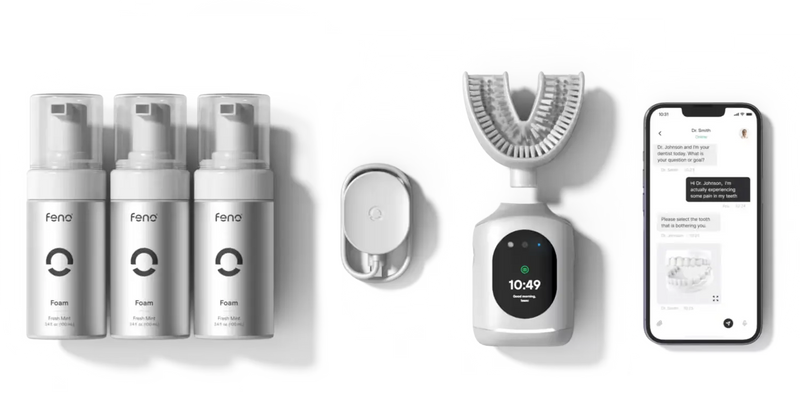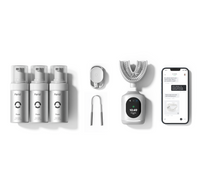
Warning Signs in Your Mouth: How Diabetes Creates Oral Health Complications Beyond Gums and Teeth
Essential Takeaways
- Your mouth serves as an early warning system for diabetes complications. Research shows 75% of diabetics develop oral symptoms including thrush, slow-healing ulcers, and fungal infections often years before systemic complications appear elsewhere.
The Diabetes-Oral Health Connection You Need to Know
When managing diabetes, most people focus on blood sugar monitoring and diet control. However, your mouth provides critical health intelligence that many overlook. High blood glucose creates an ideal environment where harmful bacteria and fungi thrive, healing processes slow dramatically, and warning symptoms emerge long before they manifest in other parts of your body.
(National Institute of Dental and Craniofacial Research)
What Current Research Reveals About Diabetes and Oral Health
Recent studies in diabetes and oral medicine provide compelling evidence about oral manifestations:
Prevalence Statistics:
- 75% of diabetics experience oral health complications, with epidemiological studies consistently showing prevalence rates between 60-80% across different populations
- 30% of poorly controlled diabetics develop oral thrush, according to a 2024 review in the Journal of Clinical Endocrinology, with rates reaching 25-40% in patients with uncontrolled hyperglycemia
- Oral ulcers heal 3-5 times slower in diabetic patients compared to non-diabetics due to impaired blood vessel formation and compromised immune function
The Science Behind Delayed Healing: Hyperglycemia directly impairs vascularization and neutrophil function, creating marked delays in oral mucosal healing. High glucose concentrations in saliva and oral tissues create an environment that promotes bacterial overgrowth and fungal infections.
Critical Oral Warning Signs Every Diabetic Should Monitor
Immediate Red Flags: (World Journal of Diabetes, 2019)
- White patches on tongue or inner cheeks (oral candidiasis/thrush)
- Mouth sores or cuts that don't heal within 7-10 days
- Persistent dry mouth (xerostomia) that increases infection risk
- Unusual taste changes or burning tongue sensations
- Recurring gum infections or bleeding
Advanced Monitoring Strategies:
- Track correlations between oral symptoms and blood sugar readings
- Document healing times for any mouth injuries
- Note changes in saliva consistency or flow
- Monitor for increased tooth sensitivity or loose teeth
Prevention and Management Tips
Daily Self-Care Protocol:
- Perform daily oral inspections for white patches, unusual sores, or color changes
- Use antimicrobial, alcohol-free oral care products to prevent opportunistic infections without worsening dry mouth
- Maintain optimal blood glucose levels to reduce oral complication risks
- Stay hydrated to combat xerostomia and support natural oral defenses
Professional Care Guidelines:
- Schedule dental visits every 3-4 months instead of the standard 6 months
- Seek immediate dental evaluation for unusual mouth symptoms
- Inform your dentist about blood sugar control status and recent A1C levels
- Consider professional fluoride treatments to strengthen enamel
The Role of Technology in Early Detection
Modern oral health monitoring technology is revolutionizing how diabetics can track oral complications. Devices like the Feno Smartbrush represent the next generation of oral care technology, offering features specifically beneficial for diabetic patients:
Feno Smartbrush Advanced Features:
- Oral scanning capabilities document changes over time and detect early warning signs
- Health alerts that can identify concerning patterns in your oral health
- Reporting and tracking that correlates oral symptoms with your overall health data
- Oral Health Coach for sharing oral health trends with your healthcare providers
- Rapid 20-second brushing cycle with high bristle count for thorough plaque removal
Feno Smartbrush's comprehensive monitoring capabilities align perfectly with current best practices for diabetes oral care management. The device's ability to track oral inflammation, detect early changes, and provide personalized AI-driven insights makes it particularly valuable for diabetics who need enhanced oral health vigilance.
When to Seek Immediate Medical Attention
Contact your healthcare provider or dentist immediately if you experience:
- White patches that don't brush away
- Mouth sores lasting longer than two weeks
- Sudden changes in taste or persistent metallic taste
- Severe dry mouth that affects eating or speaking
- Signs of oral infection (fever, swelling, pus)
Integrating Oral Health Into Your Diabetes Management Plan
Your oral health should be considered a vital sign in diabetes management. Work with both your endocrinologist and dentist to:
- Coordinate care schedules around diabetes appointments
- Share blood glucose logs with your dental team
- Adjust oral care routines based on blood sugar control
- Monitor oral symptoms as indicators of overall diabetes management effectiveness
The Bottom Line: Your Mouth as a Health Dashboard
Research consistently demonstrates that oral manifestations often precede other diabetic complications by months or years. By implementing daily oral monitoring, using appropriate antimicrobial care products, and maintaining regular professional dental care, you can catch complications early and prevent serious health problems.
Remember: optimal oral health isn't just about preventing cavities it's an integral part of comprehensive diabetes care that can provide early warnings about your overall health status.

Feno Founders Edition Bundle
Advanced Oral Health in 20 Seconds with the Feno Smartbrush™
Get Yours Now!





